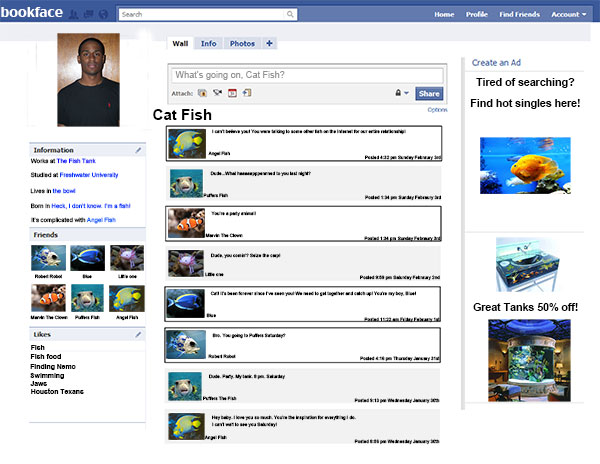
Reggie Butler
The Signal
The scenario goes as follows. You’ve received a friend request and message from this gorgeous person you’ve never met. She tells you how cute she thinks you are and how much you have in common.
You begin chatting back and forth, and this person seems to meet all of your qualifications, both mentally and physically. Before too long, you start talking on the phone and texting every day with this person. You’re truly falling in love with the idea of this individual; however, she never wants to video chat or actually meet you.
This trend in online scamming is termed “catfishing.” There is no Merriam-Webster definition, but the ever-so-popular Urban Dictionary describes catfishing as when “someone pretends to be someone they’re not using Facebook or other social media to create false identities, particularly to pursue deceptive online romances.”
This type of deception has been occurring for many years now, but Manti Te’o, Notre Dame’s star linebacker and Heisman Trophy finalist, recently brought his catfish affair into the national spotlight. A recent documentary and a MTV show by Henry Joost and Ariel Schulman, both titled “Catfish,” have also made the term popular.
You would think that people would see the signs they are being scammed. There are plenty of stories in the news and on TV about the dangers of meeting people online. Everyone 18 and older should be familiar with the red flags by now.
It’s similar to when your parents tell you not to take candy from strangers and someone approaches you with an enormous chocolate bar. You want the candy so bad, but you have what your parents told you in the back of your head. What logic goes on in your mind that determines your next step? What tells you to trust this complete stranger with your heart, despite all the warning signs?
Are victims simply looking for something to keep them entertained? Is their life just too boring? Maybe there’s a curiosity factor. There is always the idea of ‘what-if’ in the back of everyone’s minds that somehow justifies going against what you know is right or wrong.
Take into consideration the recent “catfishing” of Manti Te’o. He was publicly dating a girl he met on Facebook, who he later found out was being impersonated by his former high school classmate Ronaiah Tuiasosopo.
What I don’t understand is why the big man on campus, the star of the football team, and the university’s ideal student-athlete, was more fascinated in the idea of a person on Facebook than the multitude of women around him.
A similar incident almost occurred with the NFL’s Washington Redskins football team. A half dozen players were caught up in a catfish scenario that began with the impersonation of an adult entertainer on Twitter. Luckily, before any of the players became too attached to the woman, the team’s public relations representative uncovered the scam.
Despite all of these questions being brought up about relationships through social media, I will never understand the logic behind it. It doesn’t make sense that so many well-known athletes go through social media to meet people when beautiful and wealthy people surround them all day.
The best way for me to comprehend what is going on is to keep in mind that people inherently look for the person who embodies their idea of perfection. These people online are creating perfect personas that make love seem easy. I believe that it is a person’s flaws that truly make them intriguing.
With plenty of fish in the sea, everyone seems to be falling for the catfish.

